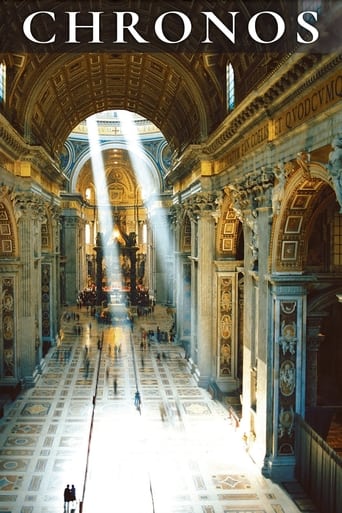mihai_chindris
This is the first time I see a documentary that has no talking in it. Music is extremely blissful and resonates with every scene we watch. It becomes almost like a whisper when a landscape from nature is presented and gets louder and louder while parts from the urban jungle approach. It shows you almost any corner of the Earth and it does this in such a way that you remain astonished by what you see. It is, indeed, a pleasure to watch and make you feel comfortable and relaxed.
BretonFianderAMC
Chronos is an interesting movie, it doesn't have any conventional storyline, and no dialogue, it's just really gorgeous imagery and music, which surprisingly was a one long continuous track composed by Michael Stearns which ran throughout the entire movie. I really like how this film was shot, it's mostly Time-Lapse cinematography, which is just footage that is recorded for multiple hours at a time and then sped up to make it look ultra-cool, and the cinematography is just flat-out amazing, and with the locations that they capture, that makes it even better.As I said in the summary of this review, you might want to slow your brain down before watching this movie, this isn't your typical documentary, like I've stated earlier, there's no dialogue in this film, which might make it a bit boring, I'd actually recommend listening to the commentary on the DVD and Blu-ray releases for this movie so you won't be bored to death, but nevertheless, this is an amazing visual experience, and the only reason I'm giving this a 9 is because it is a bit boring at times, and it's only 42 minutes long, other than that, I'd highly recommend "Chronos".
CelluloidRehab
Ron Fricke's directorial debut, is a mixed bag. While visually stunning and musically haughty, this is nothing new for this type of genre. The genre being the silent-mentary (a film with no dialog that evokes a story or meaning using only images, still and moving, and sounds).One might remember Ron from his work on Koyaanisqatsi. He was the cinematographer on that movie (also had some writing credits). If one looks closely, you will find similarities in the looks of both movies. There is a repetition of the Grand Canyon fly over and one cityscape scene (done from mostly ground level, where there is a metal sculpture in front of a lit office building at night, with two lit buildings on each side, looking upwards). While there are similarities, there are also major differences between the two.The differences come from the directors. Koyaanisqatsi (and the other two movies in the trilogy : Powaqqatsi and Naqoyqatsi) flowed from the creative collaboration of Godfrey Reggio and Philip Glass. They imbued their movie with meaning, by combining images and music. The two elements intertwining to the point where you could not separate them. Whatever the "meaning" was left up to the viewer. They could range from "deep rooted messages" to "there was no message at all".Unfortunately, Ron's directorial debut isn't as good. He definitely does not have a Philip Glass to work with and it shows. One of the weaker elements is the music. The score is symphonic and works well generally, but is very generic sounding. There is very little about it that makes one stir (unless you got a cold draft coming in through the window and someone happens to scratch a blackboard at the same time). The visuals suffer as well. There seems to be little connection between the various places we are shown. Is there a reason we are shown this place or that place in particular ? Hard to tell. It feels more like a guided bus tour, than anything with substance behind it. Ron also seems to overdo the time lapse portions. He uses it in almost every scene. He also seems to have a fascination with the phases of the sun and the movement of sunlight during the course of a day.Don't misinterpret my critique as dislike. On the contrary, the movie has its merits and its moments. My favorite being the rise of the moon over a city at night, with the fly over and drive through ensuing at blazing fast speeds. I would have probably been better served if I had seen this movie before Reggio's trilogy. It is not as good, but its short length and beautiful imagery is definitely worth a look.
ralfleeb
`Chronos' is a documentary about time. Ron Fricke attempts to give us a different perspective on time by the use of time-lapse and slow-motion film, hence the passage of time and in particular, the consequent impact on earth, our geography, our nature, our culture. We're shown stunningly beautiful time-lapse footage of impressive deserts, stones full of character, steep mountains, restless cities, people hurrying like ants in all sorts of public and individual transportation, timeless Greek architecture, public places of well-known cities in the western world, Mont St. Michel in the Bretagne at low tide, being engulfed with water during the rise to high tide, the old Bazaar in Istanbul flocking with byers and sellers, the Pyramids of Cheops, the Akropolis in Athens, Istanbul's Hagya Sophia, contrasted by baroque churches. It's stunningly beautiful, but where, oh where is the story behind this? It's also difficult to understand how how the visual information relates to the 1980s Jean Michel Jarre style synthesizer music. Once every while there is a crescendo, the pitch of the music rises, the volume rises, oh my gosh, what is about to happen? Nothing. We are lead into these expectations several times of the documentary, and after the third disappointing crescendo the level suspense and anticipation drops to zero. I can't recommend this movie, however check out Baraka, also by Ron Fricke, where he got everything right that is wrong in Chronos.

